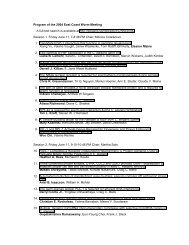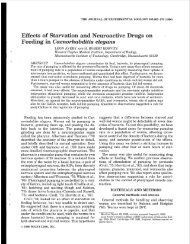- Page 1 and 2: West Coast Worm Meeting 2000 West C
- Page 3 and 4: West Coast Worm Meeting 2000 54. po
- Page 5 and 6: West Coast Worm Meeting 2000 107. S
- Page 7 and 8: West Coast Worm Meeting 2000 162. C
- Page 9 and 10: West Coast Worm Meeting 2000 217. A
- Page 11 and 12: West Coast Worm Meeting 2000 MEIOTI
- Page 13 and 14: MITOTIC CHROMOSOME SEGREGATION BY A
- Page 15 and 16: West Coast Worm Meeting 2000 A C. E
- Page 17 and 18: THE FORMIN PROTEIN CYK-1 ACTS IN PA
- Page 19 and 20: West Coast Worm Meeting 2000 CDL-1
- Page 21 and 22: MATERNAL UNC-45 PROTEIN CO-LOCALIZE
- Page 23 and 24: West Coast Worm Meeting 2000 TESTIN
- Page 25 and 26: ETHANOL SENSITIVITY GENES IN CAENOR
- Page 27 and 28: West Coast Worm Meeting 2000 THE UT
- Page 29 and 30: West Coast Worm Meeting 2000 INFORM
- Page 31 and 32: EXECUTION AND REGULATION OF MALE C.
- Page 33 and 34: NEURAL CONTROL OF LOCOMOTION IN C.
- Page 35 and 36: West Coast Worm Meeting 2000 ELECTR
- Page 37: ELECTROPHYSIOLOGICAL ANALYSIS OF SE
- Page 41 and 42: West Coast Worm Meeting 2000 THE C.
- Page 43 and 44: West Coast Worm Meeting 2000 A GLOB
- Page 45 and 46: West Coast Worm Meeting 2000 FUNCTI
- Page 47 and 48: SNAP-25, A PROTEIN IMPLICATED GENET
- Page 49 and 50: West Coast Worm Meeting 2000 UNC-43
- Page 51 and 52: West Coast Worm Meeting 2000 GENE E
- Page 53 and 54: BACILLUS TOXIN (BT) SUSCEPTIBILITY
- Page 55 and 56: TEMPORAL REGULATION OF AGING IN THE
- Page 57 and 58: West Coast Worm Meeting 2000 GERM-L
- Page 59 and 60: West Coast Worm Meeting 2000 C. ELE
- Page 61 and 62: West Coast Worm Meeting 2000 BIOCHE
- Page 63 and 64: West Coast Worm Meeting 2000 THE SP
- Page 65 and 66: West Coast Worm Meeting 2000 OOC-5
- Page 67 and 68: West Coast Worm Meeting 2000 MED-1
- Page 69 and 70: West Coast Worm Meeting 2000 THE C.
- Page 71 and 72: West Coast Worm Meeting 2000 THE PH
- Page 73 and 74: West Coast Worm Meeting 2000 RHO-1,
- Page 75 and 76: West Coast Worm Meeting 2000 GEX-2
- Page 77 and 78: A VAB-8/UNC-51/UNC-14 COMPLEX MEDIA
- Page 79 and 80: West Coast Worm Meeting 2000 IDENTI
- Page 81 and 82: UNC-119 AND AXON OUTGROWTH: TOWARD
- Page 83 and 84: RPM-1, A CONSERVED NOVEL PROTEIN, R
- Page 85 and 86: West Coast Worm Meeting 2000 MECHAN
- Page 87 and 88: West Coast Worm Meeting 2000 NOVEL
- Page 89 and 90:
West Coast Worm Meeting 2000 CALCIU
- Page 91 and 92:
West Coast Worm Meeting 2000 THE SE
- Page 93 and 94:
West Coast Worm Meeting 2000 THE TB
- Page 95 and 96:
West Coast Worm Meeting 2000 CHW-1
- Page 97 and 98:
West Coast Worm Meeting 2000 THE CO
- Page 99 and 100:
West Coast Worm Meeting 2000 TEMPOR
- Page 101 and 102:
West Coast Worm Meeting 2000 THE HE
- Page 103 and 104:
CAENORHABDITIS ELEGANS T05H10.5, A
- Page 105 and 106:
ZIG GENES AND THE PVT GUIDEPOST NEU
- Page 107 and 108:
ISOLATION OF SUPPRESSORS OF A DOMIN
- Page 109 and 110:
THE EXP-1 LOCUS MAY ENCODE A SUBUNI
- Page 111 and 112:
DOES CEH-20, AN EXD/PBX HOMOLOG IN
- Page 113 and 114:
West Coast Worm Meeting 2000 DISTRI
- Page 115 and 116:
REGULATION OF C. ELEGANS DAUER FORM
- Page 117 and 118:
THE EGL-21 GENE ENCODES A CARBOXYPE
- Page 119 and 120:
West Coast Worm Meeting 2000 NEW SC
- Page 121 and 122:
West Coast Worm Meeting 2000 SUPPRE
- Page 123 and 124:
West Coast Worm Meeting 2000 EXPLOR
- Page 125 and 126:
West Coast Worm Meeting 2000 MUTANT
- Page 127 and 128:
SPN-2 AND SPN-3 FUNCTION TO ORIENT
- Page 129 and 130:
West Coast Worm Meeting 2000 INSIGH
- Page 131 and 132:
West Coast Worm Meeting 2000 COSUPP
- Page 133 and 134:
West Coast Worm Meeting 2000 KNOCKO
- Page 135 and 136:
West Coast Worm Meeting 2000 DED GE
- Page 137 and 138:
West Coast Worm Meeting 2000 VAV IS
- Page 139 and 140:
West Coast Worm Meeting 2000 REGULA
- Page 141 and 142:
West Coast Worm Meeting 2000 SAX-1
- Page 143 and 144:
AN OVERVIEW OF PREDICTED CYTOCHROME
- Page 145 and 146:
West Coast Worm Meeting 2000 SPN-4:
- Page 147 and 148:
CHARACTERIZING THE NEURAL CIRCUITRY
- Page 149 and 150:
West Coast Worm Meeting 2000 SYNAPT
- Page 151 and 152:
SUR-7, A GENE THAT SUPPRESSES ACTIV
- Page 153 and 154:
IMPROVED TISSUE PRESERVATION USING
- Page 155 and 156:
West Coast Worm Meeting 2000 REGULA
- Page 157 and 158:
XOL-1 FILES West Coast Worm Meeting
- Page 159 and 160:
West Coast Worm Meeting 2000 LET-38
- Page 161 and 162:
West Coast Worm Meeting 2000 MULTIP
- Page 163 and 164:
SYD-8, A NEW PLAYER IN AXON GUIDANC
- Page 165 and 166:
West Coast Worm Meeting 2000 USING
- Page 167 and 168:
West Coast Worm Meeting 2000 REGULA
- Page 169 and 170:
ANALYSIS OF 2° VULVAL LINEAGE E
- Page 171 and 172:
West Coast Worm Meeting 2000 COENZY
- Page 173 and 174:
West Coast Worm Meeting 2000 LOOKIN
- Page 175 and 176:
West Coast Worm Meeting 2000 MULTIP
- Page 177 and 178:
West Coast Worm Meeting 2000 PHEROM
- Page 179 and 180:
West Coast Worm Meeting 2000 A GENE
- Page 181 and 182:
West Coast Worm Meeting 2000 SENSOR
- Page 183 and 184:
ELT-5 AND ELT-6 ARE ESSENTIAL FOR D
- Page 185 and 186:
West Coast Worm Meeting 2000 AN E1-
- Page 187 and 188:
YOU CAN’T GET THERE FROM HERE: A
- Page 189 and 190:
West Coast Worm Meeting 2000 MDF-1
- Page 191 and 192:
West Coast Worm Meeting 2000 ORGANO
- Page 193 and 194:
IDENTIFICATION OF NOVEL UNC-64 (SYN
- Page 195 and 196:
West Coast Worm Meeting 2000 A B -T
- Page 197 and 198:
CONDITIONAL MUTATIONS AFFECTING MIT
- Page 199 and 200:
West Coast Worm Meeting 2000 GENETI
- Page 201 and 202:
West Coast Worm Meeting 2000 SEQUEN
- Page 203 and 204:
West Coast Worm Meeting 2000 HIGH P
- Page 205 and 206:
FUNCTIONAL CONSERVATION OF C. ELEGA
- Page 207 and 208:
GENETIC ANALYSIS OF THE FUNCTIONS O
- Page 209 and 210:
West Coast Worm Meeting 2000 ISOLAT
- Page 211 and 212:
IDENTIFICATION OF GENES REGULATING
- Page 213 and 214:
CELLULAR AND DEVELOPMENTAL EVENTS R
- Page 215 and 216:
TRANSFORMING NEMATODES INTO INSECTS
- Page 217 and 218:
West Coast Worm Meeting 2000 OXIDAN
- Page 219 and 220:
A REQUIREMENT FOR C. ELEGANS RHO-BI
- Page 221 and 222:
West Coast Worm Meeting 2000 THE AU
- Page 223 and 224:
West Coast Worm Meeting 2000 IDENTI
- Page 225 and 226:
West Coast Worm Meeting 2000 DIFFER
- Page 227 and 228:
GLOBAL PATTERNS OF EXPRESSION PATTE
- Page 229 and 230:
West Coast Worm Meeting 2000 CALCIU
- Page 231 and 232:
VESICULAR GABA TRANSPORT IN C. ELEG
- Page 233 and 234:
West Coast Worm Meeting 2000 ACTIN-
- Page 235 and 236:
DISTINT AND REDUNDANT FUNCTIONS OF
- Page 237 and 238:
SEROTONIN-RESISTANT EGG-LAYING MUTA
- Page 239 and 240:
EVIDENCE OF A MATE-FINDING CUE IN T
- Page 241 and 242:
GENETIC SCREENS FOR NOVEL COMPONENT
- Page 243 and 244:
West Coast Worm Meeting 2000 THE EV
- Page 245 and 246:
West Coast Worm Meeting 2000 C. ELE
- Page 247 and 248:
SEARCHING FOR NEW GENES INVOLVED IN
- Page 249 and 250:
West Coast Worm Meeting 2000 CHARAC
- Page 251 and 252:
West Coast Worm Meeting 2000 CHARAC
- Page 253 and 254:
West Coast Worm Meeting 2000 NICOTI
- Page 255 and 256:
MICROARRAY ANALYSIS OF GENE EXPRESS
- Page 257 and 258:
RIC-7 ENCODES A NOVEL PRESYNAPTIC P
- Page 259 and 260:
West Coast Worm Meeting 2000 UNRAVE
- Page 261 and 262:
ESTABLISHING THE LEFT/RIGHT ASYMMET
- Page 263 and 264:
West Coast Worm Meeting 2000 MAPPIN
- Page 265 and 266:
West Coast Worm Meeting 2000 RAC-LI
- Page 267 and 268:
West Coast Worm Meeting 2000 IDENTI
- Page 269 and 270:
A SEARCH FOR LETHAL SYNAPTIC FUNCTI
- Page 271 and 272:
FATE SPECIFICATION IN MALE P(9-11).
- Page 273 and 274:
West Coast Worm Meeting 2000 ISOLAT
- Page 275:
West Coast Worm Meeting 2000 A RESO




